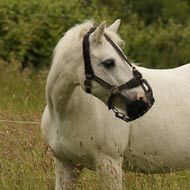
Guidance highlights risks and benefits
Welfare charities have teamed up to provide a best-practice guide for using grazing muzzles, to address horse owner concerns and misconceptions.
Grazing muzzles represent a yearly dilemma for horse owners and opinions are divided on their use.
Whilst they have a place in helping to control weight, charities say owners may leave it too late to take action, or use the muzzles inappropriately.
The National Equine Health Council (NEWC) has produced guidance and a video to explain how to introduce, fit and monitor a grazing muzzle.
Nic de Brauwere, NEWC chairman, said: “Because their impact on horse welfare is not fully understood, there is real concern amongst horse owners about the use of grazing muzzles.
"While many of our NEWC member organisations are able to use other weight management options, these alternatives don’t exist for many horse owners.
"This leaves a gap where controversy over the equipment can escalate, identifying a real need for evidence-based and impartial advice."
The guide has been created using the best evidence currently available to help owners understand the risks and benefits, whilst taking into account the potential alternatives for weight control.
Watch the video and read the guidance here: http://www.newc.co.uk/advice/horse-and-donkey-care/grazing-muzzles-2/
Image courtesy of Redwings Horse Sanctuary



 The Animal and Plant Health Agency (APHA) has updated its online reporting service for dead wild birds.
The Animal and Plant Health Agency (APHA) has updated its online reporting service for dead wild birds.